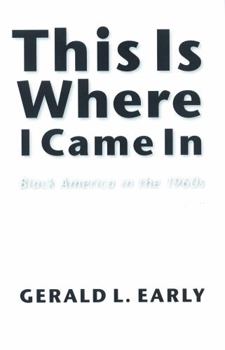This Is Where I Came In: Black America in the 1960s (Abraham Lincoln Lecture)
Select Format
Select Condition 
Book Overview
The fascinating and turbulent black America of the 1960s emerges in these essays, through the lenses of dissent and its contradictions. Gerald L. Early revisits this volatile time in American history, when class, culture, and race ignited conflagrations of bitterness and hatred across the nation. The lives of three active and influential people are given special attention: Cecil B. Moore, advocate and agitator in the "racial tinderbox" of black Philadelphia; Muhammad Ali, promoter of a "colored" consciousness; and Sammy Davis Jr., survivor of black vaudeville and liberator of black performers. The fiercely independent Moore, who rebuffed the black political establishment because it failed to address the concerns and needs of the majority of the black populace, used the authority of the NAACP to forge a militant, populist organization at the local level. Ali, one of the most widely recognized athletes of all time, combined protest and action to become a hero for black and "colored" people throughout the world, and became a type of ambassador to the Third World. Davis mirrored America's emancipation, confusion, and self-destructiveness, and, most important, its self-consciousness, which transcended even his remarkable accomplishments as an entertainer. As Early demonstrates, the careers and lives of Moore, Ali, and Davis illustrate and embody the ambiguity and struggle of American identity in the 1960s.
Format:Paperback
Language:English
ISBN:0803267495
ISBN13:9780803267497
Release Date:October 2003
Publisher:Bison Books
Length:144 Pages
Weight:0.39 lbs.
Dimensions:0.3" x 5.3" x 8.0"
Related Subjects
20th Century Africa African-American & Black African-American Studies American Literature Asia Criticism & Theory Ethnic & National History History & Criticism Literary Criticism Literary Criticism & Collections Literature Modern (16th-21st Centuries) Movements & Periods Politics & Social Sciences Social Science Social Sciences Specific Demographics TextbooksCustomer Reviews
1 rating
Balanced view of Black response to the 60's
Published by Thriftbooks.com User , 18 years ago
Early writes of three representative and important figures in the Black movement of the 60's. Mohammed Ali, Sammy Davis,Jr., and Cecil Moore. Each man represented a different way of responding to the racism around him. Easy and straight-forward, Early's discussion of the





